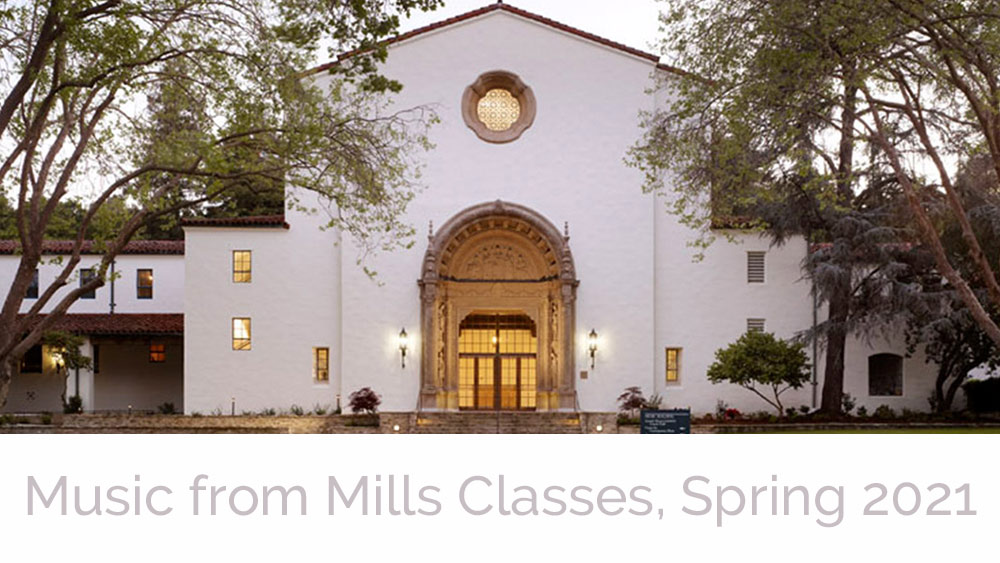Selected Issues in Contemporary Composition and Improvisation Concert
Music from Mills Classes, Spring Term
Wednesday, May 5, 2021 | 5:00 PM PDT
Presented by Mills College Music Department and Center for Contemporary Music
All Music From Mills Classes events are free and open to the public.
This semester, all events are being hosted online.
SOUNDS OF THE SONOSPHERE: POETIC RESPONSES to LISTENING — Pauline Oliveros, Jean Luc Nancy, Peter Szendy, François J. Bonnet
KYLE BATES
ADAM BRIGGS
KRISTIAN DAHLBOM
JEFFERSON DOYLE
ANGIE EDWARDS
PATRICK MATHEWS-HALMRAST SAM REGAN
CORY SIBU TRIPATHY
PAULINE OLIVEROS
“…you can’t train the ear, it does what it does. It’s a microphone. ….But what can
be trained is listening. That is what
technology is doing, it is changing the way we listen.
It can’t change the way we hear…I think listening is very close to what we call consciousness.”
“We need more words to access the richness of
auditory phenomena and to express the meaning of
sound and sounding.”
“Our vocabulary limits discussing inner or
mental sound and sounding or listening in
dreams and daydreams.”
"You might begin to notice how your attention changes
when you use auditory terms instead of visual terms
to speak about sound. Your dreams may become richer
and soniferous. Your environment might come
alive with sounds formerly unnoticed. The ear
tells the eye where to look and the eye sometimes
silences the ear"
“My appropriation of Kleiner's word "auralization" then can be used to refer to mentally modeling sound by remembering or by creating sound. We can auralize a score without sounding a note outwardly. The body can and does resonate with such auralizations.”
Poetic Responses to Pauline Oliveros:
1-Jefferson - Live Film, Video, & Sound Projection
2-Sam - PowerPoint
A brief lecture about hearing devices and domesticated rabbits.
3-Cory - Audience Participation
4-Kyle - Prose and Sound
I have utilized a handful of sound words proposed by Oliveros to alter the meaning
and tone of a preexisting piece of prose.
JEAN LUC NANCY
“What secret is at stake when one truly listens, that is, when one tries to capture or surprise the sonority rather than the message? What secret is yielded – hence also made public – when we listen to a voice, an instrument, or a sound just for itself? And the other, indissociable aspect will be: What does to be listening, to be all ears, as one would say "to be in the world," mean?”
"To listen is tendre l'oreille--- literally, to stretch the ear---"
Poetic Responses to Jean Luc Nancy
1-Adam – Live Electronics
“I believe that we are surrounded by relatively infinite depth, and we have to choose
what to open ourselves up towards.”
2-Patrick – Video performance/w/ light, sound, movement
PETER SZENDY
“We are not a community of listeners listening to one single object that joins us together, like that population with mute ears that Wagner seemed to dream of. We are an infinite addition of singularities that each wants to make itself heard hearing. Thus without any possible summing. We do not listen like one single body: we are two and (therefore) always one more.”
"Even more improbable, undiscoverable, as if it were drowned in the flood of shapeless
memories, is the moment when I began to listen to music as music."
"There in fact exist, in the history of music, listeners
who have written down their listening. These are
so-called arrangers….-
Poetic Responses to Peter Szendy
1-Sam - live drawing
"Two improvisations: first the music, next, the drawing displaying memories and real-time
reactions to the tune."
2-Angie - Fire
3-Kristian - Live electronic processing
FRANÇOIS J. BONNET
“Sound is not something that is self-sufficient and isolated
within nature. It cannot be for itself. So regardless of
whether it is audible or not, it is always coupled with a listening.
“[I]n apprehending sound oneself and one’s perception are
like a continent bordered on every side by the ocean,
perceptual multiplicity against perceived multiplicity
“…each time that I experience a sensation, I experience
that it does not concern my own being…”
"All listening is the occasion for, or the activation of, a
reflexive process in he or she who always lies at the
origin of listening: THE AUDITOR."
"It is this simultaneous multiplicity of its appearing, not its reducibility to one
thing or another that makes for the richness and the mystery of sound. Sound is irreducible
and its nature can only be a nature separated from itself. "
"hearing is a physiological phenomenon: listening is a psychological act."
Poetic Responses to François J. Bonnet
1-Adam - Prepared Piano
2-Angie - Live Electronics
3-Jefferson – Two Cristal Baschets, I play one and the transducer plays the other
4-Kristian - Live Melodica + little objects + synthesizer 5-Patrick - Recording
6-Cory - Field Recordings and live electronic signal processing
7-Kyle - Video + Buchla
I externalize my reading of Bonnet using a Buchla synthesizer and video taken at Ocean
Beach.
Trouble accessing content? Please refresh you web browser window.
Contact mpa-techsupport@mills.edu for assistance.
Learn more about the music programs and courses involved in the series on the Music Department Undergraduate and Graduate pages located on the Mills College website. For questions about the class concert series or accessibility, please contact the Mills College Music Department by emailing music@mills.edu.
